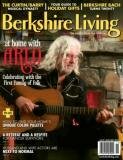
MUSIC REVIEW: BSO Opening Night at Tanglewood
TANGLEWOOD
Koussevitzky Shed
Boston Symphony Orchestra
July 9, 2010
Michael Tilson Thomas, conductor
Symphony No. 2 in C minor by Gustav Mahler
Celebrating the 40th Anniversary of the Tanglewood Festival Chorus
Reviewed by Clarence Fanto
(LENOX, Mass., July 10, 2010) — It should come as no surprise that Michael Tilson Thomas would lead a magnificent, insightful, thoughtful and viscerally thrilling performance of Gustav Mahler's titanic Symphony No. 2 ("Resurrection") for the Boston Symphony Orchestra's opening night gala on Friday, July 9.
Tilson Thomas's Tanglewood connections go back more than four decades; in 1969, he won the prestigious Koussevitzky Prize in conducting after two summers as a Tanglewood Music Center Fellow; then, he scored a meteoric rise as assistant, associate and principal guest conductor of the BSO over the following five years. At the time, some thought he was next in line to become the orchestra's music director, but twists of fate intervened.
Tilson Thomas worked with Leonard Bernstein for Lenny's 1971 Tanglewood performance of Mahler's 2nd — a performance he recalls as "incredibly hot." He was assigned to lead the off-stage martial band in the final movement. Judging by Friday night's performance — "incredibly hot" would be an appropriate description as well — he learned much from Bernstein, the acknowledged supreme master of Mahlerian interpretation.
But Tilson Thomas, now 65, made a distinctive individual mark through a very personal traversal through the sound world of the composer's boyhood homes in eastern Bohemia, then under heavy Teutonic influence as part of the sprawling Austro-Hungarian empire. Mahler grew up absorbing a pastiche of musical influences — military bands garrisoned in the town of Iglau, the deep forest surrounding that community of 20,000 people, the klezmer influences of his Jewish heritage. He heard folk songs and dance tunes on the street — it was a melting pot that the composer inhaled and later distilled through his 10 symphonies and his song cycles.
After visiting the shtetls (Jewish settlements in Bohemia, now part of Germany) of Mahler's youth and exploring the musical and literary sources that inspired the composer's most often-performed symphony, Tilson Thomas elicted a performance of raw power as well as subtlety from the BSO (just back from a one-month vacation and clearly in fighting trim), the always-magnificent Tanglewood Festival Chorus (marking its 40th anniversary under its inspirational founder John Oliver), the reigning mezzo-soprano star Stephanie Blythe and rapidly rising light-soprano Layla Claire.
The strings soared into the heights of radiance and plumbed the depths of despair in the funereal first movement, then shimmered and glistened with the joy of redemption and resurrection in the final movements. The light, dance rhythms of the second-movement landler were tossed off with delicacy and wit. The clarinets and the rest of the wind section adopted a klezmer-like sonority with keening high notes and jaunty rhythmic verve; the brass snarled in the funeral march and ultimately exulted in victory over death; the augmented percussion section (especially timpanist Timothy Genis) added thundering urgency. Harpist Jessica Zhou offered mandolin-like strokes early on, followed by angelic strains of tranquility.
Mezzo Stephanie Blythe's entrance in her "Urlicht" (Primeval Light) solo was otherworldly; rising to full volume, her pure, rich tones filled the Shed and, perhaps, contributed to the impression that soprano Layla Claire's pristine but small voice was outclassed. A minor flaw; both singers lent majesty and brilliance to the score's final pages.
Superlatives abound whenever John Oliver's chorus performs; the singers' hushed entrance in the final movement (mysterious, very slow and a triple-pianissimo as Mahler instructed) was as delicate yet well-articulated as imaginable. When Tilson Thomas urged them on to sing triple-forte for the final lines of Mahler's text ("Die shall I in order to live..."), their exclamation of joyous redemption lifted the rafters skyward.
The performance was so tightly focused and unblemished technically — even the off-stage brasses and the distant marching band — that an instant CD or MP3 download could be released with no touchups required. Some of us would gladly pay for the privilege of owning a memento of this memorable event.
We heard audience members extoling Tilson Thomas, particularly his on-stage presence and animated podium technique (less flamboyant than Bernstein, more in the tradition of Ozawa). None of that matters. The impression that lingers so vividly is that of a superbly mature, historically authentic interpretation by a conductor whose return as a honored guest conductor of the Boston Symphony and the Tanglewood Music Center Orchestra goes far to mitigate the disappointment that greeted the announcement of Music Director James Levine's absence this summer.
Clarence Fanto reviews music for Berkshirelive.com and is a contributing editor of Berkshire Living.

 Delicious
Delicious Digg
Digg StumbleUpon
StumbleUpon Propeller
Propeller Reddit
Reddit Magnoliacom
Magnoliacom Newsvine
Newsvine Technorati
Technorati
